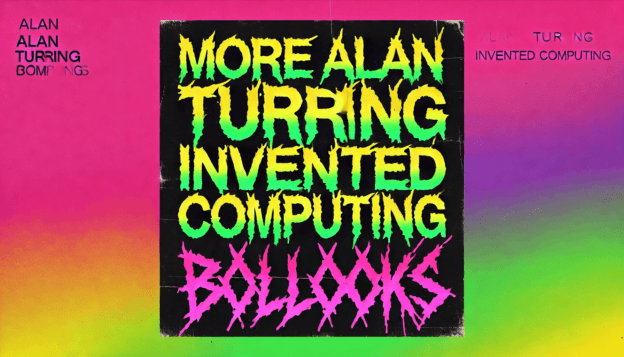Alan Turing is a bona fide genius whose contributions to computer science, cryptography, and artificial intelligence are undeniable. But in the pantheon of computing history, there’s a growing myth that Turing single-handedly “invented modern computing.” This oversimplified narrative does both Turing and the broader field of computing a disservice.
Let’s unpack the myth, celebrate Turing’s true contributions, and call out the bollocks that elevate him to a level that erases everyone else’s achievements as we compute article 34 of my satirical comedic polemic series.
“Turing Invented the Computer”
This is the big one. The claim that Turing “invented” the modern computer is a widespread misconception. While his theoretical work on the Turing Machine laid foundational groundwork for understanding computation, he didn’t build the first computer, nor was he alone in conceptualizing it.
Konrad Zuse, John Atanasoff, and Tommy Flowers (creator of Colossus) were all designing and building early computing devices around the same time. The idea that Turing single-handedly gave birth to the computer is reductive bollocks that ignore the collaborative and global nature of innovation.
“Turing Built the First Digital Computer”
Another common myth is that Turing personally built the first programmable digital computer. In reality, Turing’s theoretical work heavily influenced computing, but he wasn’t the engineer soldering wires. The first operational electronic digital computer is often attributed to the Colossus, created by Tommy Flowers and his team during WWII.
The ENIAC, built in the United States, was another landmark machine John Mauchly and J. Presper Eckert developed. Claiming Turing as the sole architect of early computing hardware is, frankly, hardware history bollocks.
“The Turing Machine = Modern Computers”
The Turing Machine, a theoretical construct, is a milestone in the study of computation, demonstrating that complex tasks can be broken down into simple, repeatable operations. But calling it the precursor to the modern computer is like calling da Vinci’s sketches the blueprint for the Wright brothers’ airplane.
Turing Machines are abstract concepts, not physical devices. Real-world computing owes just as much to advances in engineering, materials science, and applied mathematics. The idea that the Turing Machine directly spawned the laptop you’re reading this on? Conceptual bollocks.
“Turing Broke Enigma, Invented Computing, and Saved the War”
Turing’s work on breaking the Enigma code was monumental, but it was part of a team effort at Bletchley Park, involving cryptanalysts like Gordon Welchman, Hugh Alexander, and Joan Clarke. The Bombe, the machine designed to automate codebreaking, was inspired by Polish mathematicians’ earlier work on Enigma.
Turing’s contributions were pivotal, but the narrative that he single-handedly saved the war while inventing computing is wartime hero bollocks. The truth is far more collaborative and nuanced.
“Without Turing, Computers Wouldn’t Exist”
This is perhaps the most egregious piece of Turing mythos. While his theoretical contributions are foundational, the development of computers involved many pioneers across disciplines and decades. Figures like Charles Babbage and Ada Lovelace conceptualized programmable machines long before Turing, and contemporaries like Claude Shannon laid the groundwork for information theory.
Turing’s absence wouldn’t have stopped the march of progress; it might have delayed it, but computing would have emerged regardless. The idea that Turing is the keystone holding up all of modern computing is counterfactual bollocks.
“Turing Is the Father of Artificial Intelligence”
Turing’s “Can Machines Think?” essay and the Turing Test are seminal works in AI philosophy, but they’re not the foundation of artificial intelligence as a field. Pioneers like Marvin Minsky, John McCarthy (who coined the term AI), and Norbert Wiener were instrumental in building the discipline.
Turing’s contributions to AI were theoretical, but the claim that he “fathered” the field while others raised it is paternalistic bollocks.
Why the Myth Persists
Turing’s life story is compelling: a brilliant mind, unjust persecution for his sexuality, and a tragic end. The oversimplified narrative of “one man, one invention” fits neatly into public consciousness, and his status as a symbol of LGBTQ+ injustice has further amplified his legacy. None of this diminishes his genius, but the mythic status reduces the contributions of others and distorts the complexity of history.
A Better Way to Celebrate Turing
Alan Turing’s contributions to mathematics, computing, and cryptography are profound and should be celebrated for what they are: foundational, groundbreaking, and part of a larger tapestry of innovation. He wasn’t the sole inventor of modern computing, but he was a critical figure in its development.
By acknowledging the many players in computing history, we can honor Turing’s genius without resorting to overblown bollocks. History is richer, and Turing’s legacy shines brighter, when it’s grounded in truth.
